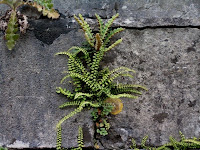The word "wall" has frequently appeared in political news over the past several years. Less quoted have been the poet Robert Frost's lines: "Before I built a wall I'd ask to know / What I was walling in or walling out, / And to whom I was like to give offense." Even beyond those lines, there are subtler and more complex thoughts in his poem "Mending Wall" -- making the following article on this website (published almost six years ago) still relevant.
~ ~ ~
I have lost count of how many times I've heard a particular line from a Robert Frost poem quoted, but quoted in a way that misrepresents it. The line is: "Good fences make good neighbors." People who quote that line get the words right but usually take it out of context. Taken by itself, the line makes it sound as if Frost is saying it is good to construct some sort of wall between people. However, in the poem, that line comes not from the lips of the speaker of the poem, but instead from the speaker's neighbor. And the thoughts of the speaker -- quite opposite to the quoted line -- are: "Something there is that doesn't love a wall...." The judgment against the neighbor is reinforced by the speaker's saying that the wall-loving neighbor "moves in darkness."
As with many of Frost's poems, physical objects (in this case, the wall) are symbols for something larger, something about human psychology or interpersonal relationships. Frost's favorite objects to employ in this way are those from Nature. Birch trees, stars, and tiny bugs all make appearances on Robert Frost's poetic stage. Despite that symbolic role Nature often plays in Frost's poems, the features of Nature he uses are not just poetic devices. Although the poet's main concern is humans, he is also interested in a right attitude toward Nature. There is thus in the poems an actual connection between humans and Nature, not an artificial linking. In Frost's poems, Nature, when viewed in the right way, is frequently able to be a real guide for human behavior. Nature can be a true reference point. It has lessons to teach.
For example, in the poem "Mending Wall" that frequently quoted line appears when the speaker pinpoints Nature -- in the form of expanding, frozen ground -- as the cause of the wall's continually falling apart:
The contemporary Christian John Haught, from a theological perspective, raises a similar question. Citing Biblical passages such as God saying, "See, I am making all things new," (Rev. 21:5, NRSV), Haught asks: "Why should we think of God principally as a 'designer?' Isn't God also the source of novelty? And doesn't the introduction of novelty inevitably disrupt perfect design?"
 The real trick is learning which features of Nature to cite when. When, as guidance, do I cite the stable features of Nature, and when do I cite the changing ones? I need to have knowledge not only of the non-human sphere of Nature but also of the human sphere -- understanding how we are both similar and dissimilar to the rest of the natural world. Knowing how to interpret the world thus calls for growing in wisdom.
The real trick is learning which features of Nature to cite when. When, as guidance, do I cite the stable features of Nature, and when do I cite the changing ones? I need to have knowledge not only of the non-human sphere of Nature but also of the human sphere -- understanding how we are both similar and dissimilar to the rest of the natural world. Knowing how to interpret the world thus calls for growing in wisdom.
2 comments:
Nature provides a feeling of being part of something larger, even when I can't sort out everything in my own life.
I sometimes remind myself, when feeling uncomfortable and disconnected in a situation, to have faith that my feeling will pass, and even hope that I will be at peace in the situation. Just as a quick-moving storm in nature may leave and be replaced by calm.
Post a Comment